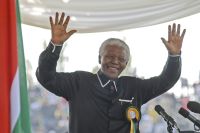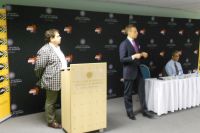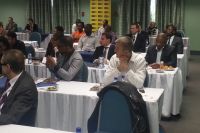
Dr. Alexander Stubb, Finland's Minister of European Affairs and Foreign Trade. Image courtesy Wikimedia Commons
(Image: © Louise Gubb)Africa-European economic relations and the challenge of overcoming financial and political alienation was the focus of a dialogue facilitated by the Nelson Mandela Centre of Memory in partnership with Brand South Africa.
Titled ‘Africa European economic relations, from alienation to co-operation’, the dialogue was held on 6 November at the Glenhove Conference Centre in Johannesburg. Finnish Minister of European Affairs and Foreign Trade, Dr. Alex Stubb lead the open panel conversation, and engaged the audience on topics such as foreign aid policy, Africa and Europe’s development challenges and political and economic alienation.
Nelson Mandela Centre of Memory Chief Executive Achmat Dangor said the Centre of Memory prides itself as being a “safe space for open discussion”.
“Madiba told us that there’s no point in bringing together people who agree with each other – rather bring together those who disagree,” he said, encouraging all present to take part in real conversation.
Dangor spoke of the Centre of Memory’s intention to initiate a series of dialogues in 2013 around political and information estrangement and economic isolation.
The Master of Ceremonies for the event, Dr. Petrus de Kock from Brand South Africa, introduced Dr. Stubb, who illustrated what he called, “political tectonic shifts”, “three mega-trends” in world politics.
“Post World War II the political world can best be described as bipolar, with the Soviet Union on one end of the political scale and the liberal democracy of the west on the other. The end of Cold War in 1989, with the fall of the Berlin Wall and the collapse of the Soviet Union, signified the birth of a new world political era, a unipolar system driven by the US,” he said.
“The third phase of world politics started four years ago, with the election of Barack Obama as President of US. A multi-polar political sphere emerged, along with diverse political extremities and views.”

Dr. Petrus de Kock form Brand South Africa (left), Dr. Alex Stubb and Cenrte of Memory CEO Achmat Dangor (far right)
Dr. Stubb questioned the concept of political arrogance, asking whether dictated monologues, as opposed to dignified dialogue, will persist in a western-dominated world.
What is required is a new approach to foreign policy, he added, where we learn, produce and process together.
He said Europe has faced regional integration in an economic crisis in the last four years.
“While the European Union (EU) pillars of peace, prosperity, security and stability remain entrenched, in the face of economic strain the cleavage between the north and the south of Europe has grown and countries now face a crisis of confidence and don’t trust each other any more. On the bright side the European Central Bank has intervened in secondary bond markets, which driven down interest rates in Spain, Ireland, Portugal and Italy,” he said.
“In addition the establishment of an European Commission Banking Union and the European Stability Mechanism, a crisis management fund that helps countries in financial distress, are positive signs for Europe,” he added.
Is dignified foreign policy possible?
In linking Africa and Europe and the notion of a dignified platform for foreign policy, Dangor insisted that European and African relations be viewed in context.
“Demographic studies in Africa show that the population in Europe is aging, yet the population is Africa is growing younger. Within the next 10 years, up to 60% of the population in Africa will be young people. The youth of this continent hold the future in their hands, literally. We need to invest in the youth, not alienate them,” he said.
Dangor asked how Europe can adapt its relationship with Africa from one that is paternalistic and conditional to one that facilitates real investment in the youth and their communities. And how can Africa help create an environment that enables direct investment into communities, he asked.
Numerous points were raised and debated by members of the audience

Members of the audience take part in the dialogue
“The foreign policy model is interventionist when it comes to funding,” said one participant. “There is also a lack of project management and financial management capacity in local government to manage foreign aid."
“Should development aid be micro-managed by private institutions or should it be a government-to-government type transaction,” asked a member of the audience.
“Is China’s involvement in Africa a threat or a blessing,” asked another. “Is China exploiting Africa’s resources, and is foreign aid conditional?”
“How can the African youth demonstrate their capability to become the leaders of tomorrow in an environment of continental conflict that is characterised by flawed leadership?” Asked a dialogue participant.
“Development aid has been used as a political tool more than a development tool,” said another. “It has removed the onus off the African to take charge and create his or her own destiny and take their rightful place in the League of Nations.”
“Trade, not aid,” argued one participant, adding that when we approach diplomacy there is a gap in understanding culture and relations that are not just political or economic, but cultural.
“The rules of engagement have to change,” stated one participant. “How do we build an economy that works for Africa and its trading partners?”
Another participant said that aid cripples Africans. “As Africans if we know help is coming, we won’t work as hard to achieve something as when there is no hope of help. We want to see more education investment, rather than aid.”
Dr. Stubb said foreign aid and corruption bring about problems with conditionality, and the donor in the middle gets ‘squashed’. In closing he asked, “How can dignified foreign policy work when states are influenced by their self-interest?”
It’s in our hands
In wrapping up the dialogue event, Dangor spoke about Africa taking responsibility for itself.
“In the ‘80s in response to the calls for disinvestment in Africa, the European Union created a special programme for the victims of apartheid. Instead of conventional welfare, they struck an agreement with a coalition of South African organisations – including churches, liberal groups and learning institutions – to facilitate real upliftment and the channeling of funds into communities by investing in existing infrastructure,” he said.
“The concept of the African stokvel needs to be embraced,” he said, describing a South African community-driven small-scale investment plan. “We need to create an enabling environment where investment can be accounted for and measured. It’s up to ordinary Africans, to help each other to help themselves,” he added.
Participants of the dialogue were then invited to continue the conversation online. To view comments and interactions please follow @NelsonMandela on Twitter.